Background
The adoption of the Virginia Association resolutions was preceded by a push from northern Virginians for expanded domestic industry. Starting in the mid-1760s, most Virginians were heavily impacted by a minor economic recession. The economic downturn was a result of the severe costs of the French and Indian War in addition to local climate difficulties, which had led to a series of poor crop yields. The economic struggles for many Virginians were exacerbated by the passage of the Stamp Act. The colonist reaction in Virginia was to encourage domestic manufacturing growth and economic diversification. After the passage of the Townshend Acts in 1767, general sentiment in Virginia pushed eagerly for some action. [1]
George Washington, at the time, a plantation owner in northern Virginia, promoted the implementation of some sort of non-importation scheme and conveyed his thoughts to his neighbor, George Mason. Washington contended that if the scheme was adopted on a large scale, the benefits would outweigh the costs of the loss of British imports. Mason, along with Washington and Richard Henry Lee, spent several weeks formulating the language of a non-importation association that would ultimately help strengthen the state's economy. [2]
Gathered at the Raleigh Tavern (run by Anthony Hay) in Williamsburg, VA, the House of Burgesses, on May 17, began discussing the Mason draft. After amending some of the articles and the preamble, the House of Burgesses, which was made up two representatives from each of the countries, proceeded to pass the Virginia Association resolutions. [3]
Content and effects
In the preamble of the Virginia Association resolutions, it was declared that the "Townshend Acts were unconstitutional and destructive to the cause of liberty." [4] The preamble also emphasized the hard times faced by Virginian plantation owners. As part of the agreement, colonists were prohibited from purchasing, after September 1, 1769, any article on a long list of enumerated goods. However, because there were some goods that could not be replaced by Virginia manufacturers, the signers made exceptions for coarse and cheap goods.
The association was also given the power to call future meetings. A meeting of one hundred signers was necessary to revise the terms of the agreement unless the British Parliament met the specific demands that were detailed in the Association resolutions.
The Association was not as successful as initially intended because there were many merchants who did not follow the boycott. British exports to the colonies declined by 38% in 1769, but British producers remained profitable because certain merchants failed to adhere to the conditions. After Britain lifted the Townshend duties from all items except tea, the Association gradually weakened, and finally collapsed in 1771. [5]

Peyton Randolph was an American politician and planter who was a Founding Father of the United States. Born into Virginia's wealthiest and most powerful family, Randolph served as speaker of Virginia's House of Burgesses, president of the first two Virginia Conventions, and president of the First Continental Congress. He also served briefly as president of the Second Continental Congress.

The Declaration of Independence, formally titled The unanimous Declaration of the thirteen united States of America in both the engrossed version and the original printing, is the founding document of the United States. On July 4, 1776, it was adopted unanimously by the 56 delegates to the Second Continental Congress, who convened at the Pennsylvania State House, later renamed Independence Hall, in the colonial era capital of Philadelphia.

Benjamin Harrison V was an American planter, merchant, and politician who served as a legislator in colonial Virginia, following his namesakes' tradition of public service. He was a signer of the Continental Association, as well as the United States Declaration of Independence, and was one of the nation's Founding Fathers. He served as Virginia's governor from 1781 to 1784.
The Navigation Acts, or more broadly the Acts of Trade and Navigation, were a long series of English laws that developed, promoted, and regulated English ships, shipping, trade, and commerce with other countries and with its own colonies. The laws also regulated England's fisheries and restricted foreign—including Scottish and Irish—participation in its colonial trade. While based on earlier precedents, they were first enacted in 1651 under the Commonwealth.
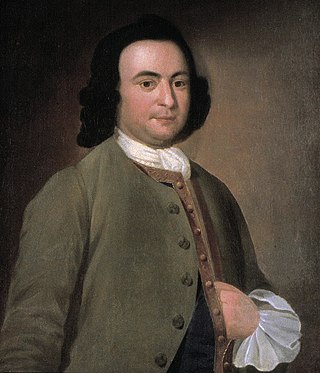
George Mason was an American planter, politician, Founding Father, and delegate to the U.S. Constitutional Convention in Philadelphia in 1787, where he was one of three delegates who refused to sign the Constitution. His writings, including substantial portions of the Fairfax Resolves of 1774, the Virginia Declaration of Rights of 1776, and his Objections to this Constitution of Government (1787) opposing ratification, have exercised a significant influence on American political thought and events. The Virginia Declaration of Rights, which Mason principally authored, served as a basis for the United States Bill of Rights, of which he has been deemed a father.
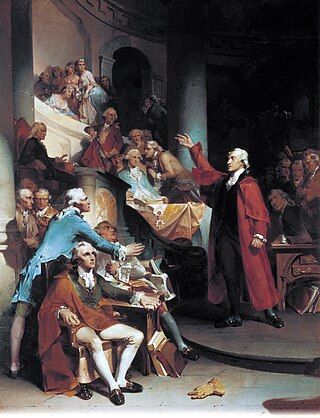
The House of Burgesses was the elected representative element of the Virginia General Assembly, the legislative body of the Colony of Virginia.
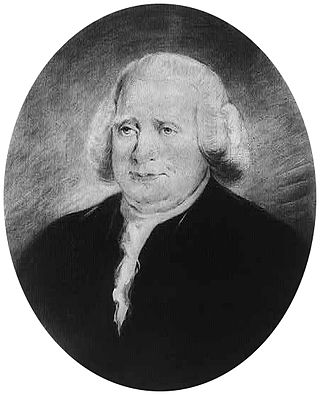
Carter Braxton was a Founding Father of the United States, signer of the Declaration of Independence, merchant, and Virginia planter. A grandson of Robert "King" Carter, one of the wealthiest and most powerful landowners and slaveholders in Virginia, Braxton was active in Virginia's legislature for more than 25 years, generally allied with Landon Carter, Benjamin Harrison V, Edmund Pendleton and other conservative planters.

The Townshend Acts or Townshend Duties were a series of British acts of Parliament passed during 1767 and 1768 introducing a series of taxes and regulations to enable administration of the British colonies in America. They are named after the Chancellor of the Exchequer who proposed the programme. Historians vary slightly as to which acts they include under the heading "Townshend Acts", but five are often listed:
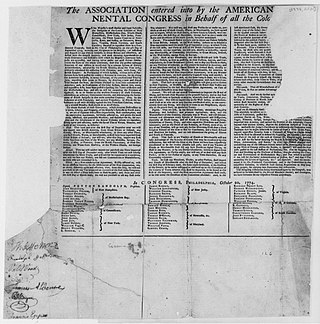
The Continental Association, also known as the Articles of Association or simply the Association, was an agreement among the American colonies adopted by the First Continental Congress in Philadelphia on October 20, 1774. It was a result of the escalating American Revolution and called for a trade boycott against British merchants by the colonies. Congress hoped that placing economic sanctions on British imports and exports would pressure Parliament into addressing the colonies' grievances, especially repealing the Intolerable Acts, which were strongly opposed by the colonies.

William Williams was an American Founding Father, merchant, a delegate for Connecticut to the Continental Congress in 1776, and a signatory to the United States Declaration of Independence.

The Boston Tea Party was an American political and mercantile protest on December 16, 1773, by the Sons of Liberty in Boston in colonial Massachusetts. The target was the Tea Act of May 10, 1773, which allowed the East India Company to sell tea from China in American colonies without paying taxes apart from those imposed by the Townshend Acts. The Sons of Liberty strongly opposed the taxes in the Townshend Act as a violation of their rights. In response, the Sons of Liberty, some disguised as Native Americans, destroyed an entire shipment of tea sent by the East India Company.

The Raleigh Tavern was a tavern in Williamsburg, Virginia, and was one of the largest taverns in colonial Virginia. It gained some fame in the pre-American Revolutionary War Colony of Virginia as a gathering place for legislators after several Royal Governors officially dissolved the House of Burgesses, the elected legislative body, when their actions did not suit the Crown. It was also the site of the founding of the Phi Beta Kappa Society on December 5, 1776.
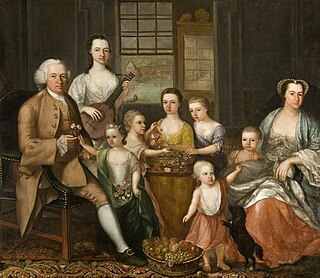
The Tobacco Lords were a group of Scottish merchants active during the Georgian era who made substantial sums of money via their participation in the triangular trade, primarily through dealing in slave-produced tobacco that was grown in the Thirteen Colonies. Concentrated in the port city of Glasgow, these merchants utilised their fortunes, which were also partly made via the direct ownership of slaves, to construct numerous townhouses, churches and other buildings in Scotland.
The Fairfax Resolves were a set of resolutions adopted by a committee in Fairfax County in the Colony of Virginia on July 18, 1774, in the early stages of the American Revolution. Written at the behest of George Washington and others, they were authored primarily by George Mason. The resolutions rejected the British Parliament's claim of supreme authority over the American colonies. More than thirty counties in Virginia passed similar resolutions in 1774, "but the Fairfax Resolves were the most detailed, the most influential, and the most radical."

Tobacco cultivation and exports formed an essential component of the American colonial economy. It was distinct from rice, wheat, cotton and other cash crops in terms of agricultural demands, trade, slave labor, and plantation culture. Many influential American revolutionaries, including Thomas Jefferson and George Washington, owned tobacco plantations, and were hurt by debt to British tobacco merchants shortly before the American Revolution. For the later period see History of commercial tobacco in the United States.
The Petition to His Majesty, The Memorial to the House of Lords and The Remonstrance to the House of Commons, commonly referred to collectively as the 1768 Petition, Memorial and Remonstrance (PMR), are a series of imprints that record a protest by the Virginia House of Burgesses in April 1768 that was sent to the British government by then-acting Lieutenant Governor John Blair.
The Boston Non-importation agreement was an 18th century boycott that restricted importation of goods to the city of Boston. This agreement was signed on August 1, 1768 by more than 60 merchants and traders. After two weeks, there were only 16 traders who did not join the effort. In the upcoming months and years, this non-importation initiative was adopted by other cities: New York joined the same year, Philadelphia followed a year later. Boston stayed the leader in forming an opposition to the mother country and its taxing policy. The boycott lasted until the 1770 when the British Parliament repealed the acts against which the Boston Non-importation agreement was meant.

George Washington's political evolution comprised the transformation of a young man from a moderately wealthy family in the British colony of Virginia motivated largely by self-interest, into the first president of the United States and one of the Founding Fathers. Washington was ambitious for the status and influence with which he had been surrounded in a youth spent around his half-brother Lawrence and the influential Fairfax family Lawrence married into. After working as a surveyor, a position he gained with the patronage of the Fairfaxes, Washington sought to emulate his brother's military career with a commission in the Virginia militia, despite his lack of military experience. With the patronage of more influential people, he was appointed major in 1752. The following year, he was appointed special envoy charged with delivering to the French a demand to vacate territory claimed by the British. His successful completion of this task gained him his first measure of renown. Washington was promoted in 1754 and made second-in-command of the Virginia Regiment. He enhanced his reputation with his first military victory in the Battle of Jumonville Glen, a skirmish that ignited the French and Indian War. He was promoted again in 1755 and given command of the regiment, serving until his resignation in 1758. During his military service, Washington grew disillusioned with the British because of his treatment as a second-class citizen and the defensive strategy they adopted during the war. He gained no further opportunity for military honor and failed to achieve his ambition of a royal commission in the British Army.

Charles Carter was a Virginia planter, politician and slave owner, one of four men of the same name who served in the Virginia General Assembly during the late 18th and early 19th century. One historian has distinguished him as "of Cleve", the name of the plantation he developed in King George County, Virginia, which he represented in the House of Burgesses for nearly three decades, from 1736 until his death in 1764. As discussed below, he may also be noteworthy as an early Virginia winemaker. His son, also Charles Carter, but known for much of his lifetime as Charles Carter Jr., served alongside his father in the House of Burgesses representing King George County, and continued to serve until financially embarrassed following the death of their political ally, powerful speaker John Robinson. However, the younger man survived the resulting scandal concerning loans made from currency scheduled to be burned, having bought property in Stafford County and represented that county for many years, despite the American Revolutionary War and ongoing financial problems.
The Loudoun Resolves was a resolution adopted by a committee in Loudoun County in the colony of Virginia on June 14, 1774, during the very early stages of the American Revolution. It was the one of the earliest public declarations objecting to the Intolerable Acts, passed by Parliament to punish Massachusetts Colonists for conducting and supporting the Boston Tea Party. The Loudoun Resolves also was the first colonial document implying its signers would employ force in resisting Britain's use of military power to implement the Acts, which it declared would cause a civil war. Loudoun colonists at the same time declared a boycott of all East India Company products and an end to commerce with England until the Boston Port Act, the first of the Intolerable Acts, was repealed and Parliament abandoned political control of its North American colonies.


















